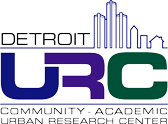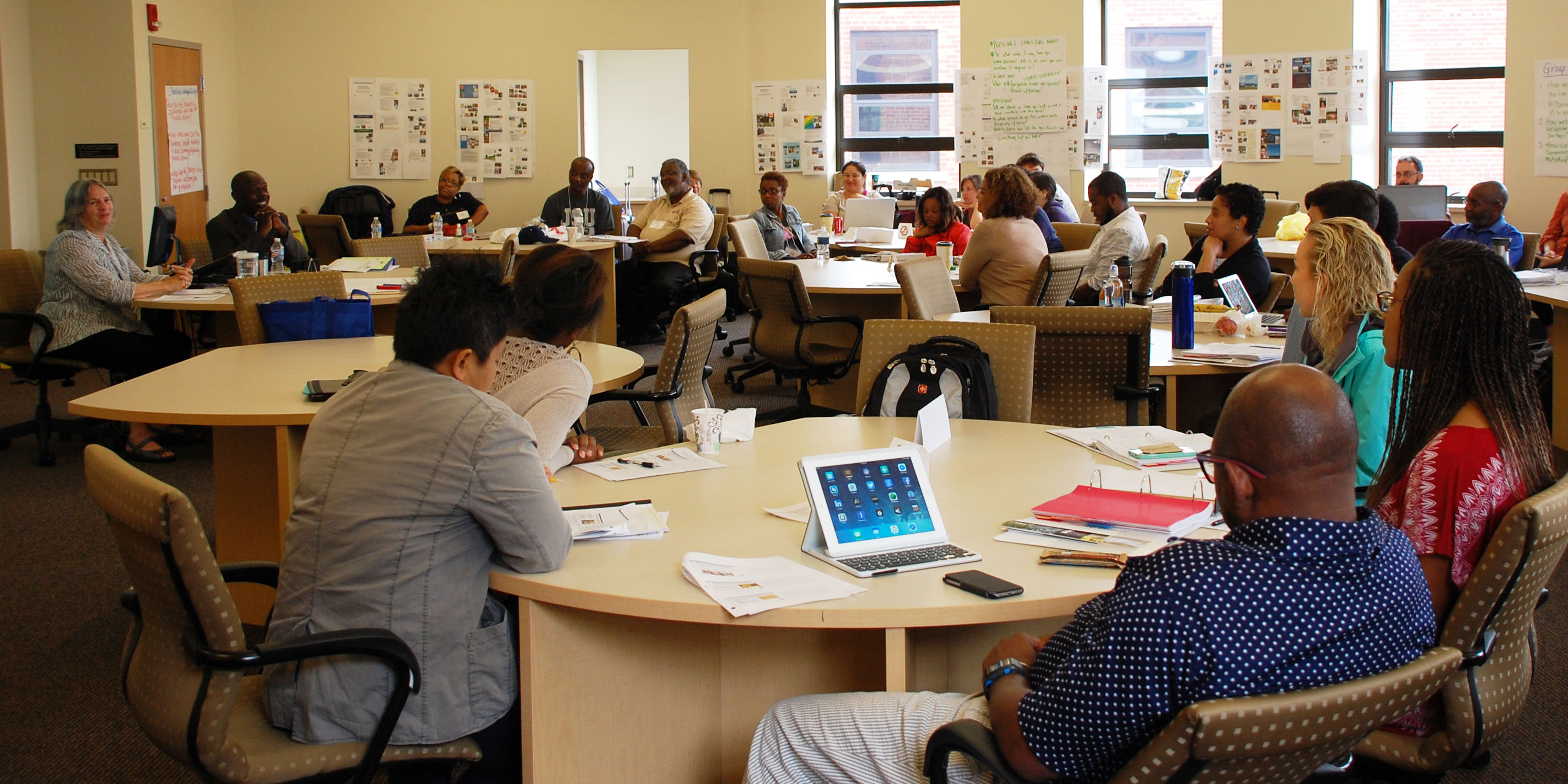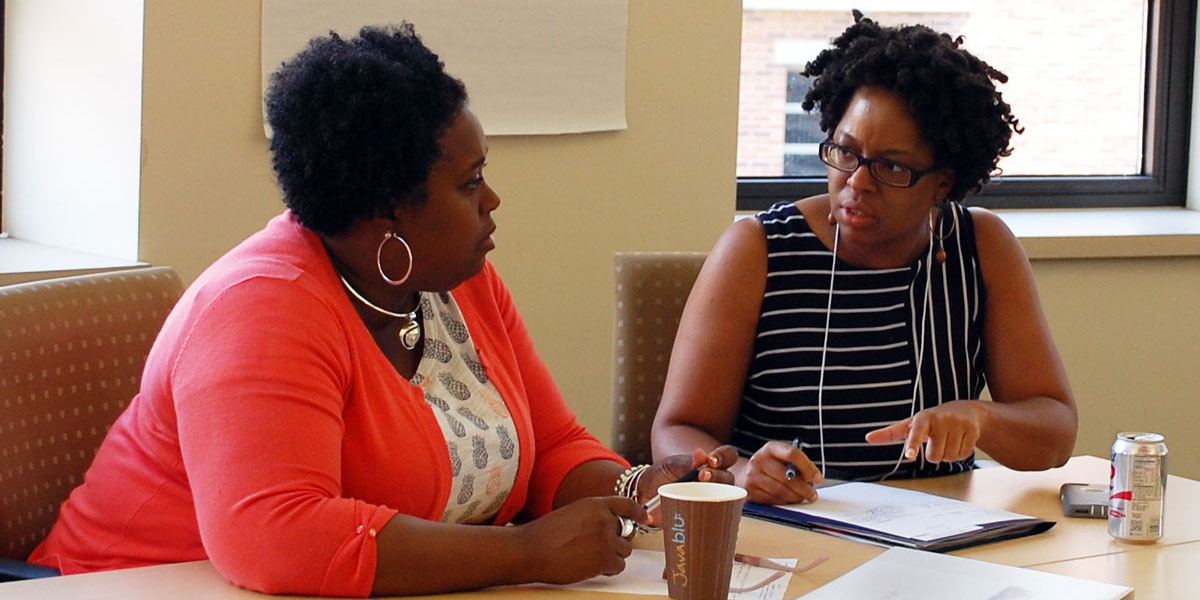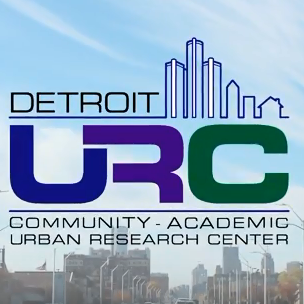Small Planning Grant Recipients
The Detroit URC’s Small Planning Grant program has funded 23 projects in 9 rounds of funding since 2010 averaging $4,000 per award; a total of $91,982 has been allocated overall. Past funding sources include the National Institute on Minority Health and Health Disparities, the Michigan Institute for Clinical and Health Research (MICHR), and the University of Michigan Vice Provost for Global Engagement and Interdisciplinary Academic Affairs. Funded partnerships addressed issues including: youth violence, chronic disease prevention, environmental health and justice, mental health, homelessness, Native American empowerment and culture, and faith-based care.
Round 1 Projects:
Youth Experiences of Violence, Discrimination and Harassment
Primary Partners:
- University of Michigan School of Public Health
- Ruth Ellis Center
- Detroit Hispanic Development Corporation
Goal: Develop and institutionalize a Discrimination, Violence and Harassment Work Group within the Detroit Youth Passages Project, which equitably involves community and academic partners in all phases of the research process.
Stepping Back to Move Forward: Enhancing the Process and Capacity of the Aya Collaborative
Primary Partners:
- University of Michigan School of Nursing
- Community and Home Supports, Inc.
Goal: Increase the partnerships collaborative capacity and sustainability through a systematic evaluation of membership, group process, and partnership goals.
Round 2 Projects:
Enhancing the Community Health Information Infrastructure in Northwest Detroit: Partnership Development Project
Primary Partners:
- University of Michigan School of Information
- National Kidney Foundation of Michigan
Goal: To support partnership development activities for the Northwest Detroit Steering Committee as they work together on an initiative to enhance health information infrastructure in Northwest Detroit.
Detroit Climate Action Collaborative Climate Change Action Plan
Primary Partners:
- University of Michigan School of Urban Planning
- Detroiters Working for Environmental Justice
- WARM Training Center
Goal: To collaborate on the development of the City of Detroit's first Climate Action Plan, which will address health-related impacts of climate change and will be shared with local government and other key stakeholders in the city of Detroit.
Nd'nibwaakaami - We Are Wise: Sacred Bundle! Pilot Grant
Primary Partners:
- University of Michigan School of Social Work
- American Indian Health and Family Services
- Inter-Tribal Council of Michigan, Inc.
- University of Michigan Family Assessment Clinic
Goal: To pilot cultural adaptation activities of mental health services developed through a collaborative research effort, to evaluate effectiveness of the model, and to train staff at American Indian Health and Family Services on how to implement the culturally adapted activities.
Round 3 Projects:
The Bell Tenants Research Partnership "The Partnership"
Primary Partners:
- Oakland University School of Health Sciences
- Neighborhood Services Organization Bell Support Building
Goal: To develop a partnership between Oakland University School of Health Sciences and Neighborhood Services Organization Bell Building, which is housing formerly homeless and chronically homeless individuals from Detroit and Wayne County, in order to better understand and meet the needs of these newly housed individuals.
Detroit Urban Native Health Collaborative
Primary Partners:
- American Indian Health and Family Services (AIHFS)
- North American Indian Association of Detroit (NAIA)
- Southeastern Michigan Indians, Inc. (SEMII)
- University of Michigan School of Social Work
- American Indian Services, Inc. (AIS)
Goal: To establish a working collaborative partnership that will benefit and meet the physical and mental health needs identified by the partnering agencies of the American Indian and Alaska Native community at large.
Round 4 Projects:
Detroit Homeless Health Collaborative
Primary Partners:
- Ron Beford, Executive Director, Interfaith Health & Hope Coalition,
- Paul Kilgore, MPH, MD, Associate Professor Wayne State University.
Goal: To establish, cultivate and nurture a mutually developed community-based participatory research agenda.
Preventing Substance Abuse and Mental Health Problems among Detroit Hispanic Youth
Primary Partners:
- Angela G. Reyes, Executive Director, Detroit Hispanic Development Corporation
- David Cordova, Assistant Professor, University of Michigan School of Social Work
Goal: To develop a collaborative relationship to build partnership, form and mobilize a community steering committee, and conduct substance use and mental health needs assessment.
Delray Impact Project- Translational Research to Inform Policy & Planning Decisions
Primary Partners:
- Simone Sagovac, Project Director, Southwest Detroit Community Benefits Coalition
- Stuart Batterman, Professor, University of Michigan School of Public Health.
Goal: To form an advisory taskforce that builds on existing partnerships; to translate completed and ongoing health-related research relevant to Delray and the surrounding Southwest Detroit area; and to synthesize current research, highlight findings and identify next steps including research, policy and advocacy and potential funding sources.
Engaging Small Business to Improve Health and Health Care in Detroit
Primary Partners:
- Shannon Saksewski, Program Manager for Health Education, Detroit Regional Chamber
- Jeffrey T. Kullgren, MD, MS, MPH, Assistant Professor, VA Ann Arbor Healthcare System.
Goal: To develop a sustainable collaborate that serves to develop mutually beneficial research projects to improve the health and health care of working families in Detroit; to identify and prioritize research questions of common interest; to design and initial partnered research project that aims to engage small business and working families in Detroit; and to develop a long-term strategy for building the capacity needed to sustain collaboration.
Round 5 Projects:
Forming a collaborative health research partnership to increase effectiveness and reach of chronic disease prevention and management services among Detroit’s elderly
Primary Partners:
- Susan Zanley, Director of Aging & Disability Resources, Detroit Area Agency on Aging
- Mary Janevic, Ph.D., M.P.H., Assistant Research Scientist, University of Michigan School of Public Health Center for Managing Chronic Disease
Goal: To build a strong collaborative research partnership among Detroit Area Agency on Aging, Center for Managing Chronic Disease, and other representatives of the community of older adults in Detroit; to explore research interests shared among partners; and to identify and address capacity building needs.
Community-Based Recovery and Reentry Research in Detroit
Primary Partners:
- Dwight Vaughter, CEO, Self-Help Addiction Rehabilitation, Inc.
- Juliette Roddy, Chair, Department of Health and Human Services, University of Michigan-Dearborn
Goal: To submit to NIH PAR 15-032 a call for proposals that outline Academic-Community conferences, meetings, workshops or symposia with the purpose of identifying opportunities for reducing health disparities through the use of community-based participatory research.
Round 6 Projects:
Collaborative Approach to Community-based Research on Breastfeeding
Primary Partners:
- Kiddada Green, Founding Executive Director, Black Mothers’ Breastfeeding Association
- Angela Johnson, Ph.D., Senior Outreach Specialist, Program for Multicultural Health, University of Michigan Health System
Goal: To strengthen the existing partnership with University of Michigan Health System Program for Multicultural Health and to address persistent breastfeeding barriers unique to African American women by developing culturally appropriate community-wide breastfeeding support for African American women and their children based on best practices established through community-based research practices.
Identifying Healthcare Priorities in Detroit Homeless Population
Primary Partners:
- Ron Bedford, Executive Director, Interfaith Health & Hope Coalition
- Paul Kilgore, M.D., M.P.H., Associate Professor, Wayne State University Eugene Applebaum College of Pharmacy and Health Sciences
Goal: To better understand current health conditions from a homeless individual’s perspective and to identify barriers that prevent the homeless population from seeking and acting on preventative healthcare.
Health care needs of people with intellectual/developmental disabilities living in Detroit
Primary Partners:
- Carmen McIntyre, M.D., Chief Medical Officer, Detroit Wayne Mental Health Authority
- Steven Erickson, Pharm.D., Associate Professor, University of Michigan College of Pharmacy
Goal: To improve the health of people who have an IDD related condition living in the city of Detroit through the development of a sustained relationship between community and academic partners.
Round 7 Projects:
Heat waves, housing and health: increasing climate resiliency in Detroit
Primary Partners:
- Zachary Rowe, Executive Director, Friends of Parkside
- Marie O’Neill, Ph.D., Associate Professor, University of Michigan School of Public Health
Goal: To establish a community-academic steering committee utilizing a community-based participatory research approach to support the development of long-term community partnerships addressing the health impacts of heat waves in vulnerable urban communities in Detroit, Michigan.
Development of a Hypertension Focused Community Advisory Board
Primary Partners:
- Lisa Mason, Vice President, Greater Detroit Area Health Council
- Phillip Levy, M.D., M.P.H., Professor and Associate Chair for Research, Wayne State University School of Medicine
Goal: To establish a Hypertension Community Advisory Board (H-CAB) to inform hypertension research in the Detroit area.
Round 8 Projects:
Community-Academic Partnership to Engage Family Supporters in Ongoing Chronic Disease Management For Latino and African-American Adults in Detroit
Primary Partners:
- Ricardo Guzman, Chief Executive Officer, CHASS
- Ann-Marie Rosland, M.D., M.S., Assistant Professor, University of Michigan Medical School
Goal: To tailor and optimize a program – Family Partners for Health Action (FAM-ACT) – to train patients’ family supports, along with patients, in evidence-based chronic disease activation, support, and self-management skills.
Round 9 Projects:
Enhancing Purpose-in-Life among At-Risk Latino Adolescents (EARL)
Primary Partners:
- Detroit Hispanic Development Corporation
- Michigan State University
For decades, Detroit has been a city distressed by poverty, corruption, gang activities, family and community violence, and racial tensions. Issues of hopelessness and a lack of purpose in life combine with traumatic experiences to limit productive engagement by Latino youth in their communities. Without a robust sense of purpose in life, Latino youth in distressed settings such as Detroit are likely to remain disconnected in society.
The goal of Project EARL is to identify a mechanism by which a sense of purpose in life can be enhanced among at-risk Latino adolescents enrolled in one or more of Detroit Hispanic Development Corporation’s (DHDC) programs (Joven Noble, Urban Academy, Robotics Engineering, and Environmental Engagement, Advocacy and Leadership). The objective is to conduct an experimental study that examines the effects of the Myers Briggs Type Indicator (MBTI) assessment and related Career Report on purpose in life among DHDC program participants. The MBTI Career Report applies a person’s reported type from the MBTI assessment to relevant job families and occupations identified through previous research. The MBTI Career Report will not only help Latino youth understand themselves better by learning about their perception and judgment preferences, but also how those preferences are related to their occupational interests.
Partnership for Transgender Health and Resilience in Detroit
Primary Partners:
- Trans Sistas of Color Project
- University of Michigan School of Public Health
While the visibility of Transgender and Gender Nonconforming (TGNC) communities has increased in recent years, they remain one of the most vulnerable populations in the United States and Michigan.
In order to develop and implement culturally appropriate public health interventions for TGNC youth and young adults, researchers must work in collaboration with TGNC individuals and community-based organizations (CBOs) that serve this population. This community-academic partnership between Trans Sistas of Color Project-Detroit (TSoCP) and researchers at the University of Michigan School of Public Health (UMSPH) furthers this area of research. This community-academic partnership will allow for community-engaged research that prioritizes areas of unmet need among TGNC young people in Detroit, while building the research capacity of a grassroots CBO that serves TGNC communities in Detroit.
Partnership Formation in Community-Engaged Work: The Detroit Food Academy
Primary Partners:
- Detroit Food Academy
- University of Michigan School of Social Work
From cooking delicious healthy meals for friends and family, to facilitating complex conversations with community, to developing artisanal food projects from scratch to market, students of the Detroit Food Academy (DFA) learn by transforming their ideas into reality. By developing food-based solutions in and for their communities, students learn how to identify problems, implement solutions, and grow as holistic leaders who are healthy, connected, and powerful to affect change within and beyond the local food system.
A recently-formed partnership with the University of Michigan School of Social Work will examine and enhance the impact of the DFA through a strategic process of analysis and evaluation. The goal of this partnership is to collaboratively identify the organization’s most pressing technical challenges and develop processes that will not only enhance the organization’s day-today productivity but also prepare them for future growth. Together, the team will evaluate current capacities, conduct preliminary analyses and develop support systems to improve future decision-making processes.
Exploring Research Partnership Opportunities: Youth Development Programming Impact on Neighborhood Social Conditions
Primary Partners:
- Urban Neighborhood Initiatives
- University of Michigan Youth Policy Lab
Youth need access to safe environments, trusting adults, and opportunities for learning and support in order for to succeed in achieving positive and productive futures. Developing a new partnership, Urban Neighborhood Initiatives (UNI), a nonprofit community development organization providing youth development programming, will work with the University of Michigan’s Youth Policy Lab to measure improvements in the social condition of the Springwells neighborhood of Southwest Detroit.
In order to affect positive change, UNI has invested heavily in a complex network of groups supporting young people in the Springwells neighborhood, including parents, teachers, schools, neighborhood block clubs, and nonprofits. In partnering with the Youth Policy Lab, new work will explore the ways to measure the impact of youth programs on improving the social conditions of the neighborhood as a whole. The partnership will determine areas of opportunity for collaboration, reach out to other potential partners to join the group, and seek clear areas for collaborative research.











![[USE THIS] 2017 DWEJ logo_Horizontal](/cache/widgetkit/gallery/44/[USE THIS] 2017 DWEJ logo_Horizontal-64638c1e16.png)
